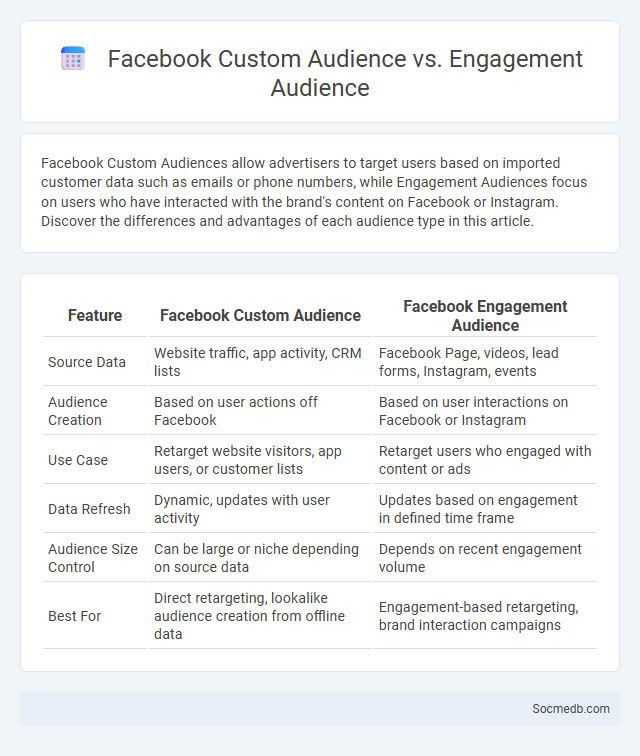
Photo illustration: Facebook Custom Audience vs Engagement Audience
Facebook Custom Audiences allow advertisers to target users based on imported customer data such as emails or phone numbers, while Engagement Audiences focus on users who have interacted with the brand's content on Facebook or Instagram. Discover the differences and advantages of each audience type in this article.
Table of Comparison
| Feature | Facebook Custom Audience | Facebook Engagement Audience |
|---|---|---|
| Source Data | Website traffic, app activity, CRM lists | Facebook Page, videos, lead forms, Instagram, events |
| Audience Creation | Based on user actions off Facebook | Based on user interactions on Facebook or Instagram |
| Use Case | Retarget website visitors, app users, or customer lists | Retarget users who engaged with content or ads |
| Data Refresh | Dynamic, updates with user activity | Updates based on engagement in defined time frame |
| Audience Size Control | Can be large or niche depending on source data | Depends on recent engagement volume |
| Best For | Direct retargeting, lookalike audience creation from offline data | Engagement-based retargeting, brand interaction campaigns |
Understanding Facebook Custom Audiences
Facebook Custom Audiences enable advertisers to target specific groups based on user data such as email addresses, phone numbers, or website activity, enhancing ad relevance and engagement. By uploading customer lists or integrating Facebook Pixel, businesses can create highly personalized campaigns that increase conversion rates and optimize ad spend. This data-driven approach leverages Facebook's extensive user base, allowing precise retargeting and audience segmentation for improved marketing performance.
What is an Engagement Audience on Facebook?
An Engagement Audience on Facebook consists of users who have interacted with your content through actions such as likes, comments, shares, video views, or event responses. This audience segment is valuable for targeted advertising because it includes people who have already shown interest in your brand, increasing the likelihood of conversion. You can create custom Engagement Audiences to refine your marketing strategy and improve ad performance by focusing on users most engaged with your Facebook presence.
Custom Audience vs Engagement Audience: Key Differences
Custom Audience targets users based on existing data such as email lists, website visitors, or app activity, enabling precise retargeting of known customers. Engagement Audience focuses on users who have interacted with your content on social media platforms, such as video views, page likes, or post comments, capturing active interest without requiring external data. Both audiences optimize ad delivery but differ in source data and user intent, with Custom Audiences leveraging direct relationships and Engagement Audiences harnessing platform-specific interactions.
How to Create a Facebook Custom Audience
Creating a Facebook Custom Audience involves uploading your customer data, such as email addresses or phone numbers, to Facebook's Ads Manager to target specific user groups. You can also build audiences based on website traffic using the Facebook Pixel or engagement with your Facebook and Instagram content. This process allows you to tailor your advertising campaigns, improving reach and conversion by targeting your most valuable users.
Types of Facebook Engagement Audiences
Facebook engagement audiences include video viewers, page engagers, and lead form openers, each representing different interaction levels with content. Video viewers can be segmented by watch time, such as 3 seconds, 10 seconds, or 95% completion, enabling precise retargeting. Page engagers cover actions like post likes, comments, shares, and event responses, providing a broader engagement scope for marketing campaigns.
Advantages of Using Custom Audiences
Custom Audiences on social media platforms allow businesses to target highly specific groups based on existing customer data, enhancing ad relevance and engagement rates. This targeted approach improves conversion rates by delivering personalized content to users who have previously interacted with the brand. Leveraging Custom Audiences also optimizes ad spend efficiency by reducing waste on uninterested audiences, maximizing return on investment.
Benefits of Leveraging Engagement Audiences
Leveraging engagement audiences on social media enhances targeted marketing efforts by focusing on users who have already interacted with your content, resulting in higher conversion rates and improved return on investment (ROI). These audiences provide valuable insights into user preferences and behaviors, enabling personalized campaigns that increase brand loyalty and customer retention. Utilizing engagement data also optimizes ad spend by reducing costs associated with broad targeting and reaching users most likely to respond.
When to Use Custom Audience vs Engagement Audience
Custom Audiences are ideal when you want to target specific users based on their interactions with your website, app, or customer list, making your campaigns highly personalized and data-driven. Engagement Audiences focus on users who have interacted with your content on social media platforms, such as video views or post likes, helping you reach a more active and interested audience. You should use Custom Audiences for retargeting known customers and Engagement Audiences to nurture and convert users who have shown interest but haven't yet engaged deeply with your brand.
Best Practices for Audience Segmentation on Facebook
Effective audience segmentation on Facebook requires leveraging detailed demographic data, interests, and user behaviors to create highly targeted ads that maximize engagement and conversion rates. Utilize Facebook's Custom Audiences to retarget previous customers and lookalike audiences to expand reach to users similar to your best customers. You can enhance your campaign's success by continuously analyzing performance metrics and refining segments based on real-time insights.
Choosing the Right Audience for Facebook Marketing Success
Selecting the right audience for Facebook marketing success involves leveraging Facebook's detailed targeting options, including demographics, interests, and behaviors, to reach users most likely to engage with your content. Utilizing Facebook Pixel data to retarget website visitors and lookalike audiences can significantly enhance campaign performance and ROI. Continuously analyzing audience insights and engagement metrics ensures campaigns remain relevant, driving higher conversion rates and brand loyalty.
 socmedb.com
socmedb.com